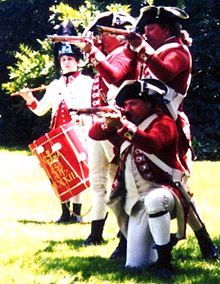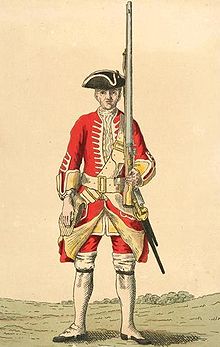An Officer and a Gentleman

In Jane Austen’s writing we encounter many military men: Colonel Brandon, Colonel Fitzwilliam, Captain and General Tilney, Lieutenants Wickham and Denny. In her tales we often read of how these men purchased their commissions, but what was the motivation for doing so and how did the process work?
Being an officer made you a gentleman
In the Regency era, social status was closely related to career and wealth. An Army officer or Navy officer was considered a gentleman. Thus a man could gain an element of “respectability” that they might not hold by virtue of their birth. Moreover an officer’s status was considered higher than that of other gentlemanly professions: the church, the law and medicine.
Why were commissions purchased?
Our modern sensibilities tend to be uncomfortable with the concept of buying a commission. In the Regency era, the system was viewed differently. They believed that since men had to pay for their rank, men of fortune and character that had a real interest in the fate of the nation would be drawn to the military.
Moreover, since they ‘owned’ their commission, they would be more responsible with their ‘property’ than someone with nothing to lose. Private ownership of rank also led to perception that since officers did not owe their rank to the King, they would be less likely to be used by the King against the people.
Purchase of commissions also served a practical purpose. The price paid for a commission served as a sort of nest egg for the officer, returned to him when he ‘sold out’ and retired. Thus there was no need to provide pensions for retiring officers.
Purchasing a commission
Reforms set in place by the Duke of York in 1796 set in place certain requirements for potential officers. Candidates had to be between the ages of 16 and 21 years of age, able to read and write and vouched for by a superior officer. Once these were fulfilled, the required sum of money would be deposited with an authorized Regimental Agent who would submit the applicant’s documentation for approval. Depending on the regiment, officers began their careers at a ‘Subaltern’ rank of Ensign, Second Lieutenant or Coronet.
How much did a commission cost?
Commissions were expensive, full stop. One had to be wealthy or have wealthy friends from which to borrow in order to afford a commission. Prices varied depending on the regiment and rank. (Keep in mind the reference point of £50 a year as minimum wage.) Subaltern rank ranged in price from £400 with the Infantry to £1050 with the Horse Guards. Lieutenant Colonel ranged from £3500 to £4950. When an officer served long enough to be eligible and wished to purchase a promotion to the next level of rank, he would pay the difference between his current commission and the next rank.
After 1795, a Subaltern (Lieutenant and below) had to serve at least three years before becoming a Captain; at least seven years in service (two as Captain) to become a Major; and nine years in service to be a Lieutenant-Colonel. Advancement above the rank of Colonel was by seniority only. Advancement was only possible if there were vacancies in the desired ranks and junior officers could spend several years without advancing.
Gaining a commission without purchase
If an individual could not afford a commission, there were non-purchase ways of obtaining a commission. A man could become a “Gentlemen Volunteer.” To do so, he would apply to the Commanding Officer of a regiment to serve at their own expense in the hope of filling a non-purchase vacancy when (and if) it occurred. It was also possible for a man to be promoted from the ranks due to valor or meritorious service. The death, disability, or retirement, of another officer might create a vacancy that needed to be filled immediately. Other openings came with the establishment of new Regiments, or the expansion of existing ones. These alternatives were much more common in times of war.
For more information see:
A Background on War. Regency Collection: Boyle, Laura.(2001) Jane Austen Centre On Line Magazine.
Advancement in the British Army Boyle, Laura.(2001) Jane Austen Centre On Line Magazine.
Entry into the Officer Corps Boyle, Laura.(2001) Jane Austen Centre On Line Magazine.
Prices of Officer’s Commissions Boyle, Laura.(2001) Jane Austen Centre On Line Magazine.
Day, Malcom. (2006) Voices from the World of Jane. Austen David & Charles .
Holmes, Richard. (2001). Redcoat, the British Soldier in the Age of Horse and Musket . W. Norton & Company
Southam, Brian (2005). Jane Austen in Context Janet M. Todd ed Cambridge University Press
by Maria Grace Copyright 2013, all rights reserved


According to this information, Colonel Fitzwilliam was likely several years older than Darcy even if he became an officer at 16. I find that very interesting. I suppose he could have been promoted for valor. Most fanfiction has him only a couple years older.
Your articles are very interesting.
In order to have been a Colonel, he would have to have served at least 11-13 years, so he would have been between 27 and 29, assuming he started at 16. So, you’re right he probably would have been a few years older than Darcy.
I am glad you are enjoying the articles. so much research goes into historical writing, that I thought these tidbits would be interesting to share.
thanks Jadie!
Maria:
I always learn something from you! Thank you for this most interesting post! I know how much time you spend doing historical research! I so admire your for that!
Barbara
thanks so much Barb. Glad I could put up something interesting.
Maria,
This was wonderful. Concise and interesting. (I’m a bit more scatter brain these days so I like short and concise).
Did you run across any research about the militia? How did Wickham get into one? Did it cost anything etc…?
Thanks, Nina. Yes, I did come across information on the militia. I was the ‘Officer and and Gentlemen’ topic will run across several articles as there was just too much to include in a single post. I try to keep these is easily readable bites, so I will be addressing the topic fairly soon.
Thanks for taking the time to comment.
I am really enjoying this. I find the differences in Regency life to be fascinating and the more I understand those differences, the more I understand the books written during the 1800s – I read more than Austen, but she is my addiction .. lol.
Reading your info made me think of Elliot in Persuasion when he extolled against the ‘status’ military officers acquired in society and of the difference in elevation of Frederick over the 8 years.
Our society certainly views the military echelon differntly and therefore modern adaptations have to put a different spin on things. which is why I enjoy moderns also.
Anyway, I’m rambling – thanks for sharing what you learned. I’m sure I’ll find myself referring back to it, and look forward to your next ‘tidbits’
I find that the more I research about Regency life the more I understand and appreciate Austen too. So many small and subtle things she puts in that I used to just gloss over stand out and make the story much much richer now. I am glad to be able to share that with you.
Thanks for coming by!
Pingback:An Officer and a Gentleman pt. 2 | Maria Grace
Thank you for the information. One of the things I find frustrating about Austen is that her military men seem to have so little connection to the activities of the military during her times. It was a period comparable to our own with wars and occupations happening on multiple continents, but her officers always seemed to be at leisure. It was after I read all of Georgette Heyer that I was able to see more clearly exactly what the lives of miltary men were like–both before, during and after their service. She writes the most delightful military men. My favorite (though not as literature but more for the wealth of information it provided) was her ‘Spanish Bride.’ What amazed me most was that it was based on a real couple. Harry Smith was one of a number of children of a country parson who came up through the ranks as you described. It made me want to write a JAFF about Lydia ‘following the drum’ and being with Wickhamin during Waterloo. It is hard for me to imagine such an experience would not change even a young woman as shallow as the youngest Bennet daughter. .
I hope to write a little bit about the life of an army officer in the next article, though a short 1000 cannot possibly do justice to the topic. What both the men and their wives endured is hard to imagine. It was a very very difficult thing that would certainly have had to change Lydia should she have experienced it.
Thanks, Beth!
There are a number of interesting memoirs that were published during and after the Peninsular War & Waterloo by officers and soldiers of various regiments. It was amazing that the wives/camp followers suffered as much as the soldiers did during those campaigns–a horrible business before the discovery of anaesthesia or antibiotics. Luckily one memoir was written about the regiment that my ancestor served in (spain/france/waterloo), which gave me a rare opportunity to see what he experienced.
Hi Maria
Thank you for the above article.
How did an officer get out of the Army? It is mentioned that Colonel Brandon had purchased an ‘exchange’ to return to England from India. How did that work? Also, in a time of war, could retired officers be recalled to duty?
Thank you
MFlannery ‘Celticjaneite’
An officer left the army by selling his commission. That was handled through official army offices. He got back the money paid for his commission.
I am not familiar with the concept of purchasing an ‘exchange’ though. I haven’t really encountered that.
Officers who retired on half pay could be recalled to duty, those who had ‘sold out’ their commissions, as far as I understand, could not.
Hope some of that is helpful.
grace
Very helpful, thank you; it solves my dilemma nicely! And for the prompt reply too… God bless you Mary CelticJaneite
You’re very welcome!
Pingback:The Regency Interpreter tackles Mansfield Park pt.2 - Random Bits of Fascination
I’m a little suspirred, but that’s only because my kids know about Pride and Prejudice. Having read both of the above books, you will have a much greater appreciation for the Zombies version having read the original! It was a fun read!
Would a young man destined for the army attend university and buy in after, or would that have been unheard of?
I think it quite possible he would have had his education first. Education was more about making connections than getting a degree, and those connections would be vital both in getting a good position in the military and in setting in later in life when he sold out.
If Wickham just joined the militia and the same system was in place there as in the Regulars, he must have been at most 21 – surely too young to have grown up with Darcy. Any ideas about this? I am puzzled.
As I understood, Wickham’s position in militia was bought for him by Darcy to get him away from Georgiana, thus the typical ages would not apply in that situation.